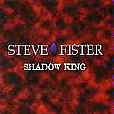Steve Fister: Some of my earliest memories were of hearing boogie-woogie piano, and big band swing jazz. The sounds made a big emotional impact on me . It created a very happy, "up" feeling. Then my brother played me the Beatles, Albert King, Chuck Berry and British blues. That was "it"! Then I started to play guitar, and my style mutated from that.
Steve Fister: Depending on the gig, whether it's studio or live I use a combination of 4x12 cabinets, a '79 Marshall 50 watt, Red Bear 120 watt, Peavy Classic 50 and a Fender Deluxe. As far as guitars go, Gibson 345 (1963), Nighthawk, Melody Maker (a '62 with mini humbucking pickups), two Ibanez custom shop "Steve Fister" models, an old Supro I use for slide, a BC Rich 6-12 double neck, and a Taylor acoustic. I use DR strings on everything. I don't want to hit the cliche meter too hard; equipment is important, but most of the tone comes from your hands.
Steve Fister: To me, music is about emotions and feelings. When I record my tunes, I try to pick what I think will be the best musicians for the songs. I try not to dictate too strongly how to interpret the material. What they would do naturally is what I want. The result is usually a fine performance and a happy bunch of players.
Steve Fister: Now that my CD, "Shadow King", is out, I'm working on a follow up for a release early next year. I wrote some new tunes that I'm really excited about recording. Also I've been playing live and recording with "The Buddah Heads". I will be doing a European and Japanese tour with them in the fall.
Steve Fister: I start by putting the ideas down on a dictation cassette recorder. Then I go back and make a proper demo on my 8-track, while keeping a log as to possible production ideas. Then, if the song holds up, I record it in a proper studio.
Steve Fister: I use my home studio strictly for writing and demos. I can't get master quality out of the gear I currently
have. "Shadow King" was done in commercial studios with all the pressure of watching the clock. Wow, I really have to invest in some recording gear!

Steve Fister: It was a necessity. In the last few years I've made a record for a major label that didn't get released. Then I signed with a indie label. I thought the majors were the bad guys, and this label would give me more attention. WRONG! To make a long story longer, the small label had bad distribution and never paid a bill, let alone the tour support and promo budget. I got out of the contract, bought my masters back, and released the disc on 2nd Degree records. Live and learn!
Steve Fister: The advantages are obvious: creative control, no one to blame but yourself, and you are free to make the best record you can. The disadvantages: little or no cash flow, weak distribution and promotion. Also, with the Internet, Guitar Nine and hopefully some additional distribution, some good things are happening. The way people buy records is changing quickly. It's just a matter of time; the web isn't going away or getting smaller.
Steve Fister: Make the best record you can, and stay true to your vision. Read all you can about promotion and marketing. There are some good books out there. Be a nice person, and try to enjoy the ride. Remember, music is suppose to be entertainment. Releasing a record is like playing the lottery, "if you don't play, you don't win!"